Another deadline has passed. But instead of bringing peace, the leaders of South Sudan’s warring parties have allowed the country to continue its slide toward famine.
Sunday was the deadline for the delegations of President Salva Kiir and his former deputy turned rebel leader Riek Machar to present a final proposal for a unified transitional government that would end eight months of conflict.
Instead, the weekend brought more fighting.
Each new clash exacerbates the country’s desperate food security situation. The international community has warned that famine could arrive as early as December. At least 1.1 million people are facing emergency food shortages. And – until fighting stops – aid agencies do not have access to tens of thousands of people who need their help.
There are no indications from the field that the clashes will stop soon. On Tuesday, during a visit of the UN security council to South Sudan, the US ambassador, Samantha Power, shared reports they had received “of more arms being brought into this country in order to set the stage for another battle”.
In early August, a local militia operating outside the command of either of the two forces executed six aid workers in Upper Nile state, near the country’s border with Sudan. They chose their targets based on ethnicity, perpetuating the tribal divisions that are driving this conflict.
By the time the two sides finally get to work in Addis Ababa, they may be drafting a solution to a situation over which they no longer have any control.
The conflict began as a political squabble between Kiir and Machar over who would control the ruling Sudan People’s Liberation Movement party. But it quickly stoked ethnic tensions as it moved across the eastern half of the country. Human rights violations became one of the grim hallmarks of the violence.
“Attacks on civilians and destruction and pillage of civilian property lie at the heart of how this war has been fought,” Skye Wheeler, a researcher with Human Rights Watch, said in an interview with IPS. Patients have been shot in their hospital beds and people sheltering in a mosque and at UN bases have been massacred. At least 10,000 people have been killed and 1.5 million displaced.
Even as violence has become the norm across large swaths of the country, the targeted killing of aid workers and other Nuers living in Upper Nile state’s Maban county may have marked the transition to a more volatile stage in this conflict.
Maban, which hosts tens of thousands of Sudanese refugees, had been relatively untouched by the fighting. But that did not stop a local militia, calling itself the Mabanese Defence Force and with no obvious alliance to either side, from executing Nuer civilians.
The UN mission in South Sudan warned that Maban was now at risk of an “ongoing descent into lawlessness” – a lawlessness that, in the absence of a legitimate peace deal, could easily spread to other areas of the country as communities decide to exact their own forms of justice.
“We’ve seen how abuse has driven further violence and more abuses during reprisal attacks directed against civilians,” Wheeler said. The weekend brought reports that another armed group was on the march in Maban, this one to exact revenge for the earlier killings.
The consequences of the Maban murders could be further reaching. The people living in the conflict regions – as well as tens of thousands of displaced people – are almost completely dependent on the UN and NGOs for food, shelter and protection.
Humanitarians were already dealing with access issues amid the fighting, as well as funding shortages. The UN estimates that aid agencies will need $1.8bn (£1.08bn) to reach 3.8 million people before the end of this year. So far, they have raised just over half.
And although the situation does not yet meet the technical criteria to be declared a famine, “there is extreme suffering”, Sue Lautze, the UN’s Food and Agriculture Organisation country director, said.
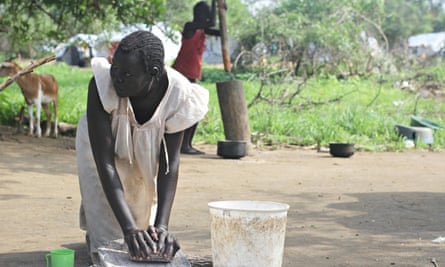
If aid workers continue to be targets, the suffering will get much worse.
In Maban, Medair, a humanitarian group, is operating water stations and running health and hygiene services for the 60,000 people, including Sudanese refugees, who live in Yusuf Batil camp and the surrounding communities. Country director Anne Reitsema said the attacks showed a “total disrespect for humanitarian actors”.
Following the attack, Medair temporarily pulled some staff members out of Maban, though leaving enough people to continue operations. It is too early to say when they will return, but Reitsema cautioned that the attack “makes it very hard for us to do our work”. The problem is, there is no one else to do it.
All of this – the increasing violence, the possible famine and another missed deadline – can be used to “shame” the two parties into an agreement that sticks, according to Jok Madut Jok, an analyst with the Sudd Institute, a local thinktank.
It’s already happening. During her visit to Juba, Power said: “We do not see the urgency that needs to be brought to these negotiations.” And the international community has raised the threat of economic sanctions once again.
It’s a strategy that has not yet worked – the US and EU have already sanctioned a military leader on each side of the conflict. But neither has anything else the local and international community has tried, which is why Jok expects that more deadlines may come and go without anything being accomplished.
“The peace talks are about what each one of them hopes to walk away with, rather than peace itself,” he said.
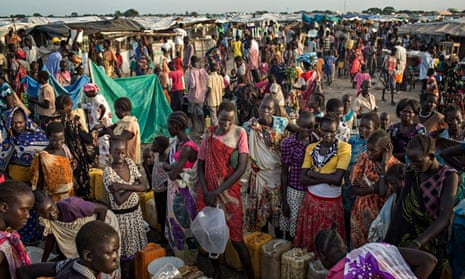
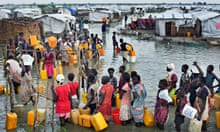
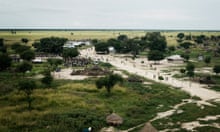
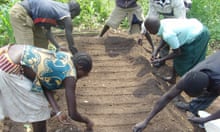

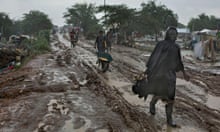
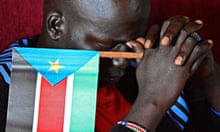
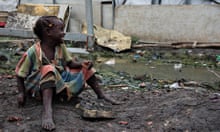
Comments (…)
Sign in or create your Guardian account to join the discussion